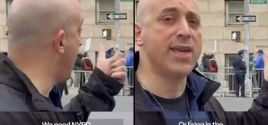Brain lie detectionDavid RowanThe Times Oct. 24, 2006 |
Popular 
ADL Urged Congress to Pass FISA Law Spying on Americans to 'Protect Israel'

Rep. Thomas Massie Warns Congress is Trying to Pass Hate Speech Laws to Outlaw Criticism of Israel

'Sniper Seen on Roof Overlooking Pro-Palestine Protest' at Indiana University

Mike Johnson Pushes Debunked Lie That Israeli Babies Were 'Cooked in Ovens' On October 7

Claim Jewish Student Was 'Stabbed In The Eye' by Pro-Palestine Protester Draws Mockery After Video Released
 You need to know if your husband has been cheating on you. Or you have to prove to police that when you sold those shares it wasn’t with insider knowledge. Until now, sorting the truth from deception has relied on subjective hunches about individuals’ honesty, or else the discredited measurements of old-fashioned polygraph machines. But what if there were a sleek scientific tool that could peer into the human brain and prove objectively when a person was lying? * As advances in neuroscience have mapped out the brain in unprecedented detail in recent years, businesses have been clamouring to commercialise the emerging research. The newest trend is for companies to offer magnetic resonance imaging (MRI) scans that they claim identify brain activity associated with deception. Already this year, new companies such as No Lie MRI and Cephos have been pitching defence lawyers, counter-intelligence agencies and suspicious spouses with their promises to reveal the cold truth. Plenty of sceptics see the claims as overhyped, and there are serious worries about ethics and civil liberties. But with billions of pounds to be made if lie detection can be reliably merchanised, the sector is about to take off. The industry’s premise is that brain activity, measured by blood flow in specific regions associated with dishonesty, can be mapped while a subject stretches inside an MRI scanner. So if, as you are being scanned, a computer screen asks questions to which you know the true answer, the patterns revealed by your brain can supposedly determine whether your responses are accurate. The claims are backed up by academic research which set out to find the truth about lying: a now famous 2001 study by psychiatrist Daniel Langleben, for instance, peered inside the heads of 18 volunteers who were told that they could keep $20 if they lied about the playing cards they were holding in a game, something that prompted lively activity in parts of the prefrontal cortex. Dr Langleben is now an adviser to No Lie MRI, which charges out its lie-detection service at around £1,000 an hour. The company is ambitious about its potential market: immigration agencies, airport security, the CIA, accounting firms and avowedly innocent prisoners. The rival Cephos Corporation, which is claiming 90 per cent accuracy in clinical tests of its brain lie detectors, is pitching primarily at government security-clearance agencies and at "the legal marketplace". "There is enormous potential for Cephos’s deception detection services to change the world of litigation," according to Robert Shapiro, an American defence lawyer who advises the company. "I’d use it tomorrow in virtually every criminal and civil case on my desk." There is already interest in Britain from defendants who see hope in the new technology. Susan Hamilton from Edinburgh, convicted of using salt to poison an eight-year-old child, said last month that she would undergo such a test to "prove" her innocence. No Lie MRI says it has also heard from a priest who denies charges of child molestation. Yet there remain serious questions about the scientific validity of the brain-scan analyses, and bioethicists worry that – accurate or not – these tests will be misused. Don’t believe me? Well, that’s up to you to prove. |



